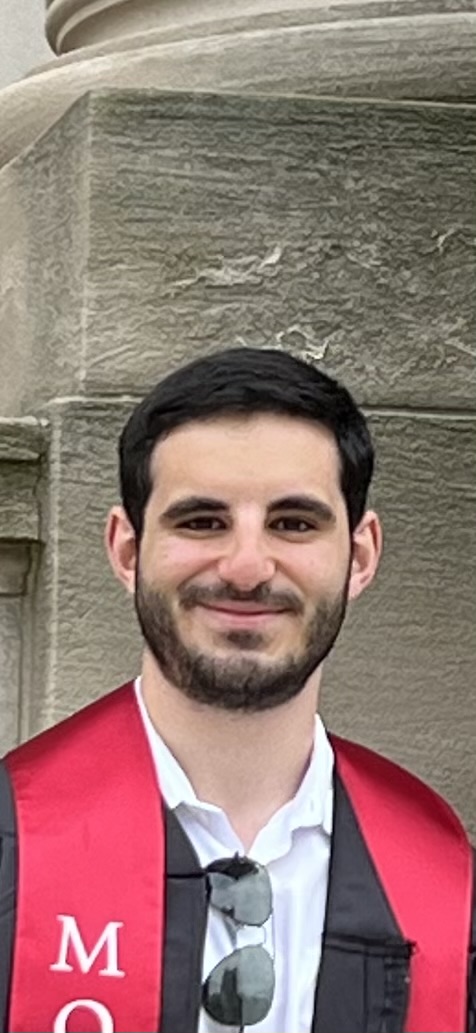Congratulations to the 2024 Joint Computer Science and Economics Award Winners!

For the first time, the Departments of Economics and Computer Science have awarded prizes for outstanding student work in coursework and senior essays in the Computer Science and Economics (CSEC) major. The CSEC interdepartmental major launched in 2019, and allows students to gain foundational knowledge of economics, computer science, and data analysis, as well as hands-on experience with empirical analysis of economic data.
The Department is proud to announce the five inaugural prize recipients: Alexander Abinader, Drew Beckmen, Ziyu Zhu, Cody Neiman, and Kelvin Kang.
The new prizes include:
Donald Brown Prize: This award is granted to seniors in the joint CSEC major who have demonstrated excellence and achieved outstanding records during their tenure at Yale. This award is presented in honor of Professor Donald J. Brown.
In 2024, the Donald Brown Prize goes to Alexander Abinader, Drew Beckmen, and Ziyu Zhu.
Professor Donald J. Brown is the Phillip R. Allen Professor of Economics and Professor of Mathematics and is a leading mathematical economist. Applying his superb talents as a mathematician to the theory of economics, he has contributed significantly to the discovery and understanding of principles underlying economic models and has developed analytic methods that invigorate the mathematical theory of economics.
Herbert Scarf Prize: This award is granted to seniors in the joint CSEC major who have presented the best senior thesis focusing on Computer Science. This award is presented in honor of Professor Herbert Scarf.
In 2024, the Herbert Scarf Prize goes to Cody Neiman.
Professor Herbert Scarf was the Sterling Professor Emeritus of Economics. Professor Scarf made foundational contributions to game theory and to general equilibrium theory, but much of his best-known work concerned the application of theory. His work on inventory management proved the optimality of (S,s) rules, and he made pioneering advances on economies with increasing returns or with indivisibilities. Professor Scarf’s long-lasting influence on economics exemplifies the value of work that interfaces theory and computation.
Martin Shubik Prize: This award is granted to seniors in the joint CSEC major who have demonstrated excellence in their senior thesis within the field of Economics. This award is presented in honor of Professor Martin Shubik.
In 2024, the Martin Shubik Prize goes to Kelvin Kang.
Professor Martin Shubik was the Seymour H. Knox Professor Emeritus of Mathematical Institutional Economics and was part of the Yale faculty since 1963. Throughout his career, he used the tools of game theory to better understand numerous phenomena of economic and political life. Professor Shubik was among the early scholars who recognized that mathematical and statistical tools could be applied to the social sciences, including economics.
Congratulations to all of these seniors for their exceptional accomplishments! Please see below for more information about the prize winners and their work.

Alexander Abinader: Donald Brown Prize
Senior Essay: Using Natural Language Processing (NLP) to Implement Sentiment Analysis and Keyword Extraction on Yale Course Evaluations (supervised by Robert Wooster)
In this project, we collected Yale course evaluations from the student-run website CourseTable. Using these text reviews, we then performed two natural language processing (NLP) techniques: sentiment analysis and keyword extraction. The overall goal was to identify suitable NLP tools that can quickly and effectively summarize key course information for the Yale community. In theory, sentiment analysis would be used to calculate the percentage of students who recommend a course, while keyword extraction would be used to identify the key skills, strengths, weaknesses, and areas of improvement for Yale courses.
“I always knew I wanted to study Econ in college but it just so happened that the Computer Science and Economics major was brand new my freshman year. I coincidentally was enrolled in CS50 which is one of the best classes I've ever taken, so I knew right then and there that this would be the major I pursue.”
— Alexander Abinader, Donald Brown Prize Winner
Drew Beckmen: Donald Brown Prize
Senior Essay: Making (Good) Matches: Building and Piloting an Online Platform for Experimental School Choice Research (supervised by Yusuke Narita)
Each year, students ranging from elementary schoolers to incoming medical residents submit ordered lists of preferred schools, which matching algorithms then use to clear the two-sided market over students and available seats. Strategyproof algorithms—those for which truth-telling is a dominant strategy—have been applied to public school choice for decades, but mounting evidence shows that market participants continue to play non-optimally by submitting untruthful preferences. Pushing participants towards optimal behavior enhances the stability of the market and can improve overall welfare, making it a worthwhile policy objective. This thesis presents MatchEd, a new platform for configuring and running online, crowd-sourced experiments related to the school choice problem. To validate the MatchEd platform, the paper presents results from pilot studies that replicate established findings in the matching mechanism literature. To conclude, the thesis outlines ways in which MatchEd can be used to test behavioral economic theories of suboptimal behavior at scale.
“The more classes I took, the richer I discovered the intersection of computer science and economics to be. From algorithmic game theory to innovative approaches in computational economics, the two fields are engaged in constant exchange of ideas that pushes the boundaries of the established modes of inquiry.”
— Drew Beckmen, Donald Brown Prize Winner

Ziyu Zhu: Donald Brown Prize
Senior Essay: On Learning in the Presence of Friction (supervised by Manolis Zampetakis)
This paper studies a generalized version of the friction model and analyzes the possibility and efficiency of statistical learning on data subject to friction. In particular, we focus on two statistical learning problems, Mean Estimation and Linear Regression. We first give a sufficient condition to identify the mean of the Gaussian or the regression parameters by considering a specific family of friction functions. Then, for Mean Estimation, we find a connection between assigning equal probability mass to multiple Gaussian measures and the famous Consensus-Halving problem, which helps us construct unidentifiable instances of friction functions for an arbitrary number of Gaussians. Finally, under a set of assumptions, we develop an efficient Projected SGD algorithm that provides an estimator of the mean of the Gaussian with a certain probability of success.
“Economics sparks my interest in theory, and Computer Science lets me bring it to life. For me, the best part is to develop methods that solve theoretical challenges.”
— Ziyu Zhu, Donald Brown Prize Winner

Cody Neiman: Herbert Scarf Prize
Senior Essay: LLM Based Linguistic Heuristics for Digital Forensics and Incident Response (supervised by Timothy Barron)
Cody's thesis applies econometric principles using Large Language Models (LLMs) to process linguistic data inside numerical modeling contexts. In the domain of Digital Forensics and Incident Response, where the volume, diversity, and interconnectivity of log data present unique challenges, this innovative approach enables the extraction and processing of textual data without the need for predefined rules or mappings. By employing trees of dynamically cascading prompts on millions of log entries, this method assembles a precise incident timeline tied to Indicators of Compromise—potentially supplanting the role of traditional digital forensic analysts. The study showcases improved performance in bespoke scenarios and highlights stronger alignment with human understandings of suspicious events than traditional methods reliant on static Key Performance Indicators. Cody's research underscores the potential of LLMs to pave the way for more effective autonomy in both proactive and reactive cybersecurity solutions.
“The most exciting aspect of economics for me has always been the extraction of natural experiments from raw data—unveiling causality within mere correlations. In an endless pool of data, it's about turning the abstract into actionable insights, a challenge that continues to inspire my passion for computer science, economics, and cybersecurity.”
— Cody Neiman, Herbert Scarf Prize Winner

Kelvin Kang: Martin Shubik Prize
Senior Essay: Estimating Storm Surge Probability Distributions and their Associated Economic Damages Using NOAA Tidal Data Along the American Atlantic Coast